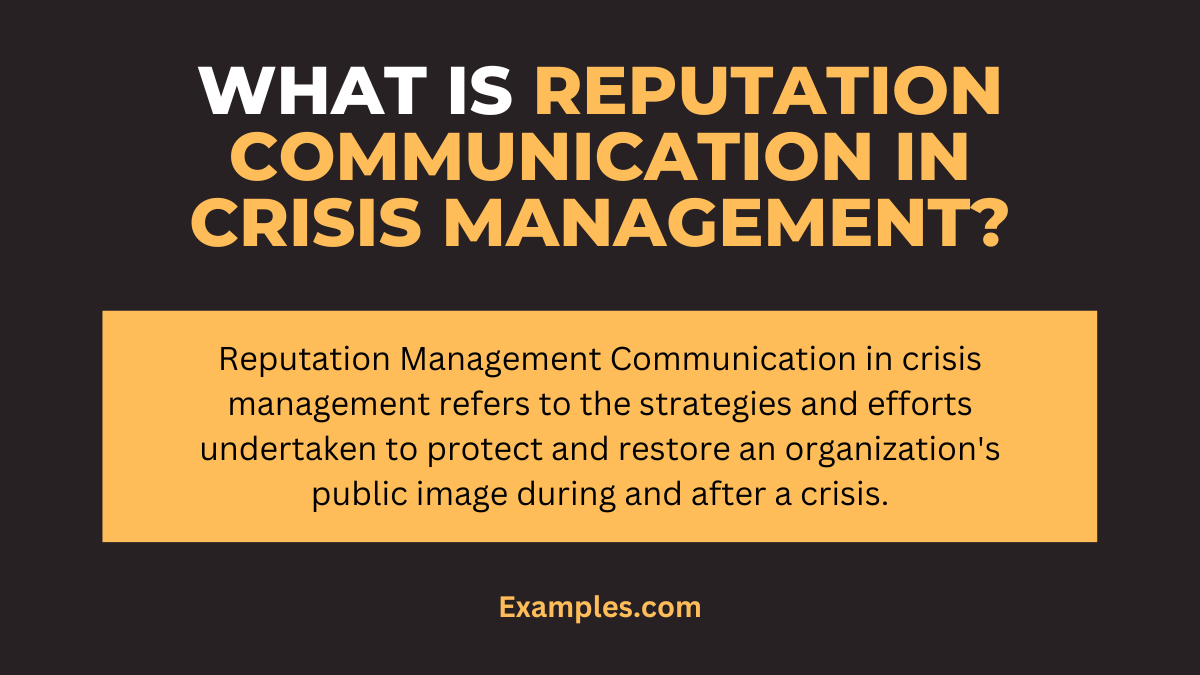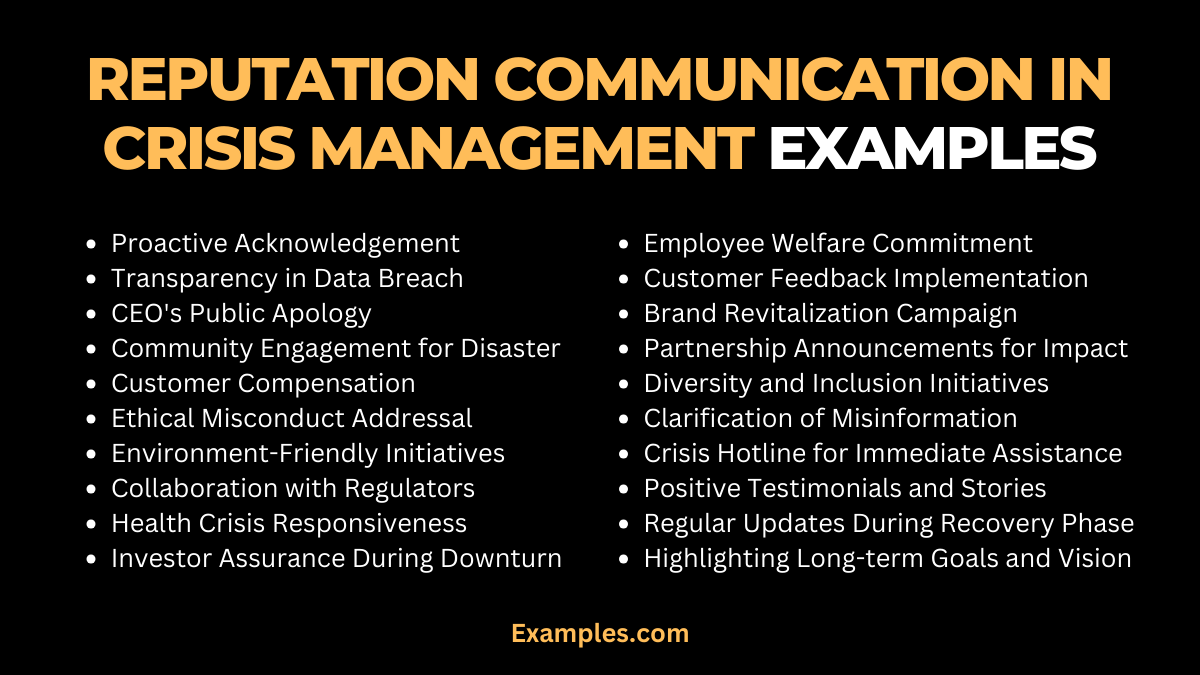19+ Reputation Management Communication in Crisis Management Examples
In crisis management, Reputation Management Communication plays a crucial role in safeguarding an organization’s public image. This comprehensive guide delves into effective strategies and real-world examples to illustrate how businesses can adeptly handle crises while maintaining their integrity. It emphasizes the importance of timely, transparent, and empathetic communication to manage stakeholders’ perceptions and trust. The guide covers various aspects from media relations to social media strategies, providing valuable insights for anyone looking to navigate the complex landscape of crisis communication and reputation management.
What is Reputation Management Communication in Crisis Management?

Reputation Management Communication in crisis management refers to the strategies and efforts undertaken to protect and restore an organization’s public image during and after a crisis. This type of communication focuses on addressing the crisis, minimizing damage to the organization’s reputation, and reassuring stakeholders, including customers, employees, and investors. Effective reputation management communication involves transparent, consistent, and empathetic messaging, aimed at maintaining trust and credibility with the public.
20 Reputation Management Communication in Crisis Management Examples

Reputation Management Communication is a critical aspect of crisis management, focusing on preserving and restoring a company’s public image during challenging times. This involves strategically crafted messaging and engagement tactics to address concerns, clarify situations, and rebuild trust among stakeholders. Below are 20 unique examples, each highlighting a different approach to effective reputation management in various crisis scenarios.
- Proactive Acknowledgement: A company immediately acknowledges a product flaw reported in social media, explaining the measures being taken for resolution.
- Transparency in Data Breach: A tech firm transparently communicates about a data breach, detailing the extent of the issue and steps for consumer protection.
- CEO’s Public Apology: The CEO of an airline company publicly apologizes for service disruptions, outlining future improvements.
- Community Engagement Post-Natural Disaster: A corporation actively engages in community rebuilding efforts post-natural disaster, highlighting their commitment through various communication channels.
- Customer Compensation Announcement: A travel agency announces fair compensation for service failures during a peak season, restoring customer trust.
- Ethical Misconduct Addressal: A corporation addresses ethical misconduct allegations against a top executive, ensuring strict adherence to corporate ethics henceforth.
- Environment-Friendly Initiatives Post-Crisis: A manufacturing company announces new environment-friendly policies following an ecological crisis, emphasizing their commitment to sustainability.
- Collaboration with Regulators: In response to regulatory scrutiny, a financial institution communicates about collaborating with authorities for compliance and transparency.
- Health Crisis Responsiveness: A food company swiftly addresses a health scare linked to their products, explaining safety measures and quality checks.
- Investor Assurance During Financial Downturn: A publicly-traded company reassures investors during a financial downturn, outlining a clear recovery plan.
- Employee Welfare Commitment: Post-layoffs, a tech giant communicates its continued commitment to employee welfare and future hiring plans.
- Customer Feedback Implementation: Following customer backlash, a retail brand announces changes based on customer feedback, demonstrating attentiveness to consumer needs.
- Brand Revitalization Campaign: Post-reputation damage, a fashion brand launches a revitalization campaign, focusing on its legacy and future vision.
- Partnership Announcements for Positive Impact: An energy company partners with environmental groups post-crisis, highlighting joint efforts in sustainability.
- Diversity and Inclusion Initiatives: In response to public criticism, a corporation announces new diversity and inclusion initiatives, showcasing its commitment to a positive workplace culture.
- Clarification of Misinformation: A pharmaceutical company addresses and clarifies misinformation about its products circulating online.
- Crisis Hotline for Immediate Assistance: A company sets up a crisis hotline post-incident, providing immediate assistance and information to affected individuals.
- Positive Testimonials and Stories: Amidst negative press, a brand shares positive testimonials and success stories to balance the narrative.
- Regular Updates During Recovery Phase: A business provides regular updates during a recovery phase, maintaining an open line of communication with its stakeholders.
- Highlighting Long-term Goals and Vision: A corporation shifts focus to its long-term goals and vision post-crisis, rebuilding its future-oriented image.
Why is Reputation Management Communication Important in Crisis Management?
Reputation management communication in crisis management is crucial as it directly impacts an organization’s public image and trustworthiness. During a crisis, how a company communicates can either mitigate or exacerbate the damage to its reputation. Effective communication can help maintain customer trust, prevent misinformation, and demonstrate the organization’s commitment to resolving the crisis. It’s a key factor in determining how the public and stakeholders perceive the organization post-crisis.
What are the Strategies of Reputation Management Communication in Crisis Management?
Here are the Strategies of Reputation Management Communication in Crisis Management:
- Transparent and Honest Messaging: Be forthright about the crisis, acknowledging its impacts truthfully. This transparency is key to maintaining trust.
- Consistent Communication Across Platforms: Ensure that your message is unified across different channels, from social media to press releases, to avoid confusion and misinformation.
- Engage with Stakeholders: Keep open lines of communication with all parties affected, including customers, employees, and investors. This engagement shows commitment to addressing their concerns.
- Monitor and Respond to Public Sentiment: Actively monitor public reactions and tailor your communication strategy to address the evolving sentiment.
- Show Empathy and Responsibility: Express genuine concern for those impacted. Accept responsibility where needed, as it can help in rebuilding trust.
- Provide Regular Updates: Continuously update stakeholders on the progress in managing the crisis, reinforcing your commitment to resolution.
- Use of Social Media Effectively: Utilize social media for quick and direct communication. It’s an effective tool for real-time updates and engaging with the audience.
- Post-Crisis Analysis and Communication: After the crisis, openly communicate the lessons learned and steps taken to prevent future occurrences. This communication helps in restoring confidence and repairing any damage to reputation.
How to Handle Reputation Management Communication in Crisis Management?
Here are the strategies for reputation management communication in crisis:
- Quick Assessment and Response: Swiftly analyze the crisis and respond promptly. Timely responses are crucial to mitigate negative impacts on reputation.
- Accurate and Honest Information: Always disseminate truthful, transparent information. Honesty enhances credibility and trust, especially in crisis situations.
- Stakeholder Engagement: Proactively communicate with stakeholders, addressing their concerns and questions. Engaging with them builds trust and demonstrates commitment to transparency.
- Consistent Messaging Across Platforms: Ensure that all communications across various platforms are consistent. Uniform messaging helps in maintaining a coherent narrative.
- Monitor Public Sentiment: Continuously monitor how the public and media are reacting. Adjust your communication strategies based on this feedback to better manage public perception.
- Post-Crisis Analysis: After the crisis, thoroughly review the effectiveness of your communication. Learn from this analysis to improve future crisis response strategies.
Tips for Effective Reputation Management Communication in Crisis Management
Here are the Tips for effective reputation management communication in crisis management:
- Proactive Monitoring: Vigilantly observe online mentions and sentiment to gauge public perception. This helps in identifying potential issues early and addressing them promptly.
- Empathy in Communication: Express genuine concern for those affected by the crisis. Empathetic communication can significantly enhance the organization’s image and stakeholder relations.
- Transparency: Maintain openness about the crisis and the measures being taken to address it. Transparent communication builds trust and demonstrates accountability.
- Regular Updates: Provide consistent updates to keep stakeholders informed about the latest developments. This helps in managing expectations and reduces misinformation.
- Crisis Communication Team: Establish a dedicated team responsible for all crisis-related communications. This team should be trained and prepared to handle the crisis effectively.
- Long-Term Strategy: Develop a long-term plan for rebuilding and enhancing the organization’s reputation post-crisis. This includes ongoing engagement with stakeholders and continued monitoring of the organization’s public image.
In conclusion, effective reputation management communication during a crisis is paramount. By transparently addressing issues, engaging stakeholders, and committing to ethical practices, organizations can rebuild trust and maintain their long-term reputation. Timely and sincere communication, combined with proactive measures, ensures a positive image even in challenging times. Remember, reputation is not only about crisis response but also about building resilience and trust for the future.



